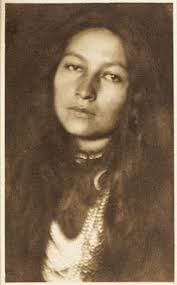Sing Ruby Siu
English 48B
January 23, 2009
Journal #6 Zitkala Sa (Gertrude Simmons Bonnin)
QUOTE:
“Under a sky of rosy apples we dreamt of roaming as freely and happily as we had chased the cloud shadows on the Dakota plains. We had anticipated much pleasure from a ride on the iron horse, but the throngs of staring palefaces distributed and troubled us” (1114).
SUMMARY:
In Zitkala Sa’s publication “The School Days of an Indian Girl,” she depicts her experience of attending the boarding schools that were built to teach and civilize Indians. The above quote is extracted from the passage at the very beginning of her experience so as to foretell readers how her real experience contrasted with the dreamy visions she once had before coming to the East. At first, the white missionaries came to her very wigwam and promised her that she would be able to taste the “big red apples” and ride the iron horse. After coming to the school, Zitkala Sa realized that the white teachers had been not that nice to her and her imaginary vision were broken since then.
RESPONSE:
At the age of eight, Zitkala Sa’s innocence and curiosity “led her to desire the apple orchards and to choose to be educated by the missionaries” (Wikipedia). Under her strong request to taste the white education and culture, her mother agreed to send her over to the hands of the whites. However, not long after she arrived, Zitkala Sa’s hair, which she was very proud of, was cut under whites’ forces. For this, she remembered the practice and beliefs of her people about cutting hair, and she felt that she lost the dignity and strength an Indian American should have. Besides this, she was required to report on time, speak in English and dress in foreign clothes. By doing these on a daily routine, she gradually lost her connection to the native religions, customs, culture and people. At first, she only felt her apparent hatred towards the whites, just like what the quote says. However, after her return to home, she suddenly realized that  she was no longer the wild child she used to be. She now embodies a double, conflicting identity that she felt not completely attached to either end.
she was no longer the wild child she used to be. She now embodies a double, conflicting identity that she felt not completely attached to either end.
Often times these kind of paradoxical emotions happened. My grandmother has lived through the time of Japanese Invasion in China, so she yielded a profound remorse and hatred towards the Japanese. She used to tell me stories about how her relatives fell under the torture of Japanese when she was five years old, and I was deeply shocked by the fact. Her remorse was soon transferred to me at a young age, who also considered the behavior of Japanese disgraceful. However, as a child, I also fanatically fell in love with the Japanese comics, toys, computer games, fashion and food. Changing from prejudice to acceptance or even fantasy, I was shameful and sorrowful about my attitude change and assimilation when I thought of the Chinese history part my grandmother told me. It was at that time I started question my identity– whether I was the patriotic Chinese or a traitor? Although this kind of issue was diluted these days, I still felt the same kind of paradoxical feelings Ziitkala Sa felt.



20/20 The comparison with your grandmother's experience is quite fascinating.
ReplyDelete